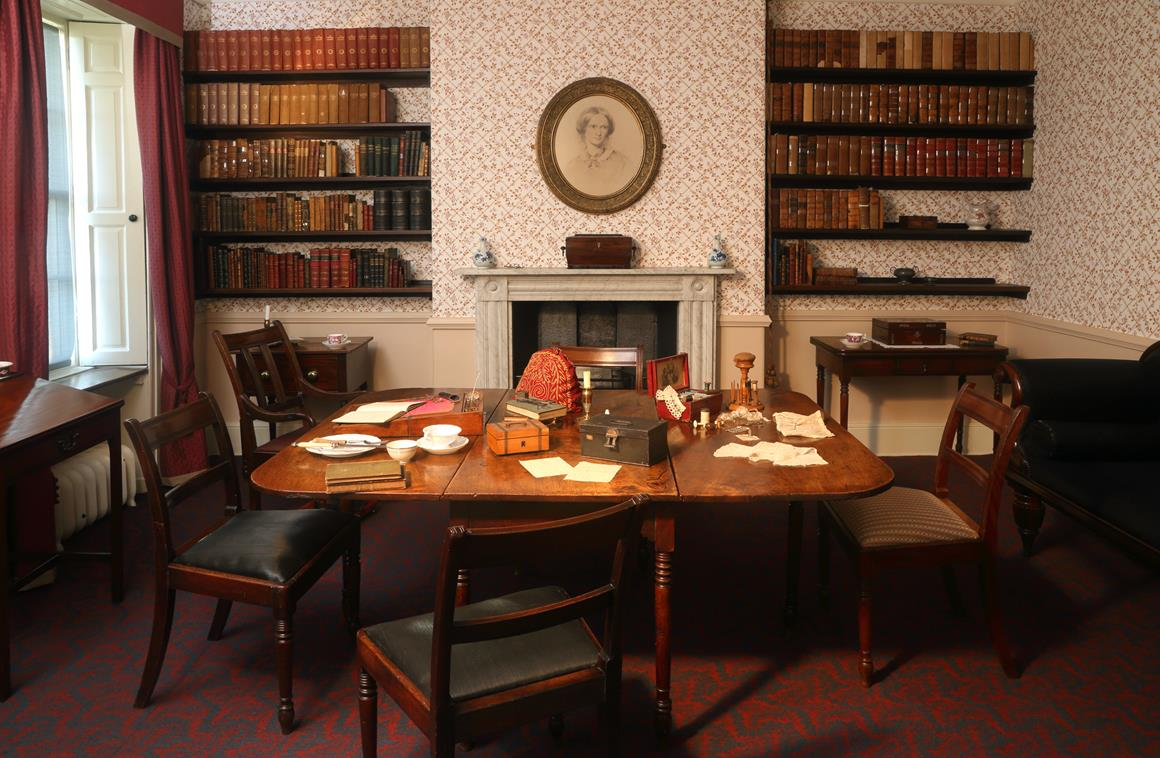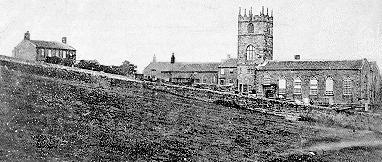When Charlotte's friend Ellen Nussey visited Haworth in 1833, she reported that Emily and Anne were "like twins", "inseparable companions". She describes Anne at this time:
Anne was barely a year old when her mother became ill. Maria Branwell Brontë died on September 15th, 1821. Elizabeth Branwell agreed to stay. Thus, she was a surrogate mother to Anne throughout her childhood. Anne slept with Aunt Branwell, not with Charlotte and Emily. She and her aunt were particularly close, and this loving adult role model may have strongly influenced Anne's personality and religious beliefs. The character of Agnes Grey refers to poems as "pillars of witness" in a passage that may well reflect Anne's own view: Anne's religious poetry certainly fits this pattern.
Warm hands are there, that, clasped in mine,
The warmer heart will not belie;
While mirth, and truth, and friendship shine
In smiling lip and earnest eye.
"Anne, dear gentle Anne was quite different in appearance from the others, and she was her aunt's favourite. Her hair was a very pretty light brown, and fell on her neck in graceful curls. She had lovely violet-blue eyes, fine pencilled eyebrows and a clear almost transparent complexion. She still pursued her studies and especially her sewing, under the surveillance of her aunt. " (Chitham, 1991, p. 39) edu//bronte-anneAnne Brontë was born on January 17th, 1820, at Thornton (see also The Brontë Birthplace). Anne was the last of the six children of Patrick and his wife Maria Branwell Brontë. Her siblings, by age, were Maria, Elizabeth, Charlotte, Branwell, and Emily Jane. Patrick Brontë was the curate of Thornton. Given the size of the family, Patrick actively sought a better clerical appointment. After much difficulty, he was appointed to the perpetual curacy of Haworth. The Brontë family moved to the parsonage there in April, 1820.
Anne was barely a year old when her mother became ill. Maria Branwell Brontë died on September 15th, 1821. Elizabeth Branwell agreed to stay. Thus, she was a surrogate mother to Anne throughout her childhood. Anne slept with Aunt Branwell, not with Charlotte and Emily. She and her aunt were particularly close, and this loving adult role model may have strongly influenced Anne's personality and religious beliefs. The character of Agnes Grey refers to poems as "pillars of witness" in a passage that may well reflect Anne's own view: Anne's religious poetry certainly fits this pattern.
"When we are harrassed by sorrows or anxieties, or long oppressed by any powerful feelings which we must keep to ourselves, for which we can obtain and seek no sympathy from any living creature, and which yet we cannot or will not wholly crush, we often naturally seek relief in poetry–and often find it, too–whether in the effusions of others, which seem to harmonize with our existing case, or in our own attempts to give utterance to those thoughts and feelings in strains less musical, perchance, but more appropriate, and therefore more penetrating and sympathetic, and for the time, more soothing, or more powerful to rouse and to unburden the oppressed and swollen heart. Before this time, at Wellwood House and here, when suffering from home-sick melancholy, I had sought relief twice or thrice at this secret source of consolation; and now I flew to it again, with greater avidity than ever, because I seemed to need it more. I still preserve those relics of past sufferings and experience, like pillars of witness set up in travelling through the vale of life, to mark particular occurrences. " (Agnes Grey, Everyman Classics Edition, 1985, pp. 121)
THOUGH bleak these woods, and damp the ground
With fallen leaves so thickly strown,
And cold the wind that wanders round
With wild and melancholy moan;
With fallen leaves so thickly strown,
And cold the wind that wanders round
With wild and melancholy moan;
There is a friendly roof, I know,
Might shield me from the wintry blast;
There is a fire, whose ruddy glow
Will cheer me for my wanderings past.
Might shield me from the wintry blast;
There is a fire, whose ruddy glow
Will cheer me for my wanderings past.
And so, though still, where'er I go,
Cold stranger-glances meet my eye;
Though, when my spirit sinks in woe,
Unheeded swells the unbidden sigh;
Cold stranger-glances meet my eye;
Though, when my spirit sinks in woe,
Unheeded swells the unbidden sigh;
Though solitude, endured too long,
Bids youthful joys too soon decay,
Makes mirth a stranger to my tongue,
And overclouds my noon of day;
Bids youthful joys too soon decay,
Makes mirth a stranger to my tongue,
And overclouds my noon of day;
When kindly thoughts, that would have way,
Flow back discouraged to my breast;–
I know there is, though far away,
A home where heart and soul may rest.
Flow back discouraged to my breast;–
I know there is, though far away,
A home where heart and soul may rest.
[Page 121]
Warm hands are there, that, clasped in mine,
The warmer heart will not belie;
While mirth, and truth, and friendship shine
In smiling lip and earnest eye.
The ice that gathers round my heart
May there be thawed; and sweetly, then,
The joys of youth, that now depart,
Will come to cheer my soul again.
May there be thawed; and sweetly, then,
The joys of youth, that now depart,
Will come to cheer my soul again.
Though far I roam, that thought shall be
My hope, my comfort, everywhere;
While such a home remains to me,
My heart shall never know despair!
My hope, my comfort, everywhere;
While such a home remains to me,
My heart shall never know despair!
ACTON.
The manuscript version of this poem is dated November 7th, 1843. Although it is 'signed' with a Gondal signature, "Hespera Caverndel", it may also reflect Anne's personal feelings about her home. There are some minor differences in spelling and formatting; the original manscript does not contain any punctuation.
Anne Brontë's 195th birthday is celebrated on the web with several posts: Giving the Forgotten Sister and Badass Feminist Author Her Due is the rather explicit title of Flavorwire's post:Anne Brontë, born on January 17, 1820, is often the butt of Brontë jokes. She’s known as the forgotten Brontë sister, or the one with less talent compared to preternatural geniuses Charlotte and Emily. But this is a simplistic reading of her life. Anne lacked her sisters’ wild romanticism and affinity for dark heroes, but she had a strength and gift all her own, and leaves a strong feminist literary legacy. (Sarah Seltzer) And you can also find vindications of the work of the youngest of the Brontë sisters on Hard Book Habits, Alba Editorial's Facebook wall, Legimus, Book Perfume, etc. bronteblog
.jpg)



I think someone who was concerned she was dying without leaving a mark in the world , would be very gratified to know that 195 years after her birth, she is both well remembered and has vigorous champions .
BeantwoordenVerwijderenHappy Birthday Anne!